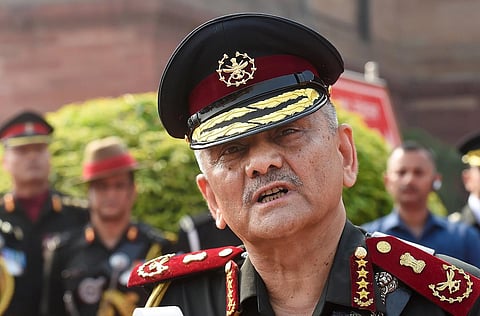

BENGALURU: In a world rife with conflicts, future security challenges will be driven by the trajectory of the ongoing and unprecedented changes in global geopolitics, said the Chief of Defence Staff (CDS), Gen Anil Chauhan. In his virtual address during the ninth Synergia conclave in the city, he said the rules and maxims of diplomacy are fading away giving way to new ones.
“Events are unfolding at a speed and pace that exceeds our ability to respond and react effectively. The current challenges to national security are not only a result of interstate competition or uncertainty, but pandemics, biological, cyber and nuclear threats and trans-national terrorism. There is a movement toward convergent warfare, which integrates traditional domains of warfare with emerging domains such as cyber and space. New technology will result in the battle space becoming more automated and autonomous.The Indian armed forces should be able to usher in a thorough revolution in military affairs (RMA) along with other nations to remain ahead or at par with this transformational curve,”he said.
“Technological endeavours are ushering in a new age of combat with higher rates of lethality as well as complexity of detection and engagement. Technology is emerging as the new currency of power. What we are now witnessing is a race to retain technological edge and a new, emerging military revolution that foresees a change in tactics and a change in organisation to support the same,” said the Defence chief.
He said the Indian armed forces will have to “operate in an environment that is being shaped by the rapidly shifting geopolitics. They will require flexibility not only in their organisational structure but also doctrinal, conceptual, behavioural and cultural structures as well as in their mindsets. They must be flexible and adaptable enough to absorb and harness niche, emerging and disruptive technologies”.
On the paradigm shift in geopolitics and geo strategy, he said the new redistribution of power has made the world a plateau. “There is an increasing proclivity to enter conflict to protect perceived national interests but in most cases, it has been done without a clear exit strategy. For instance, Afghanistan, Iran and Ukraine. Many interstate conflicts have also occurred due to existing but latent disputes for example, Azerbaijan, Hamas, Russia and Ukraine.”
He added that under this new emerging reality “nation states will find security and comfort in newer alliances and partnerships and will be subjected to frequent realignments to meet the real or perceived challenges. Unipolarity will become an artefact of the past and a multipolar global order with polycentric competition and cooperation will emerge. It will induce stability and the new poles will balance out each other. This will however encourage low intensity conflict proxy wars at the bottom of the pyramid,” said Gen Chauhan. He cautioned that the world will witness more geopolitical conflicts in the coming 12 years than in the last two decades.